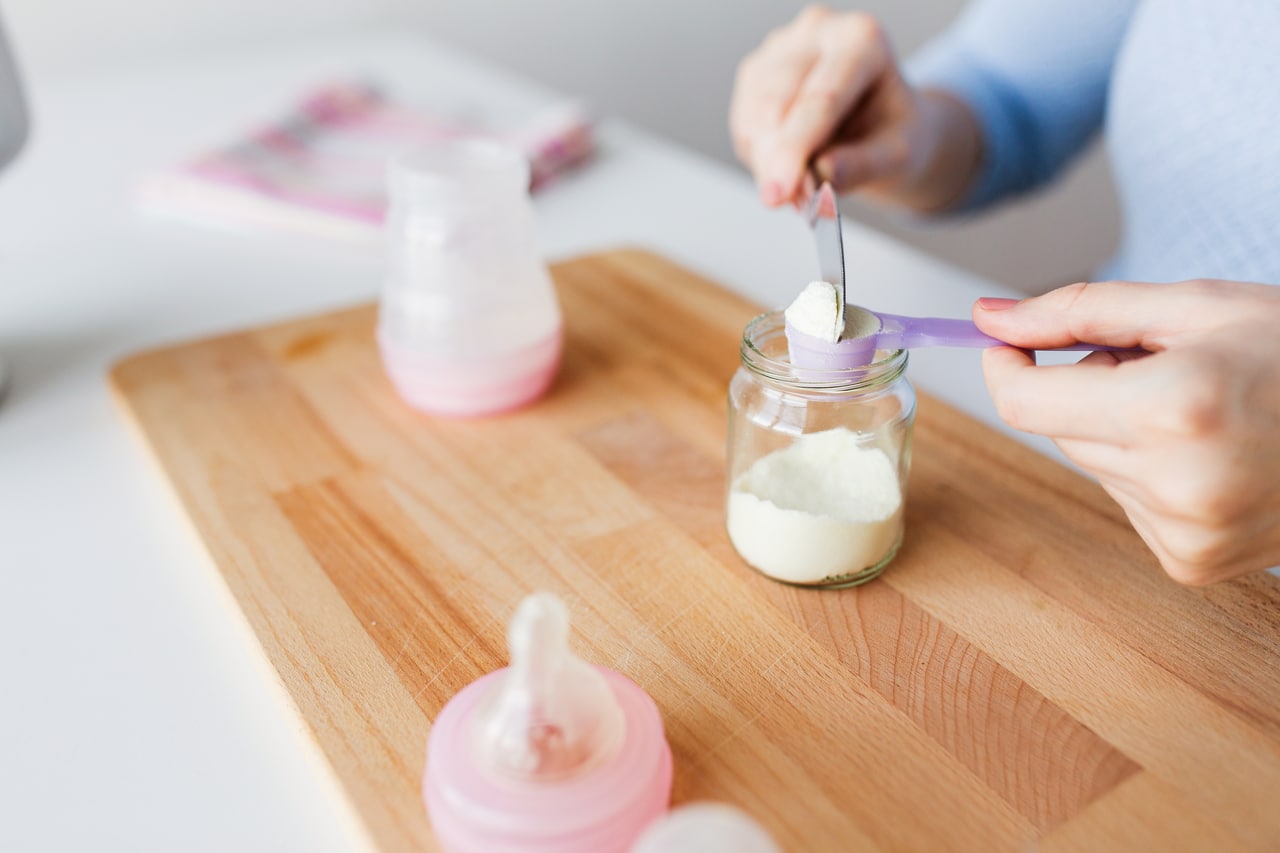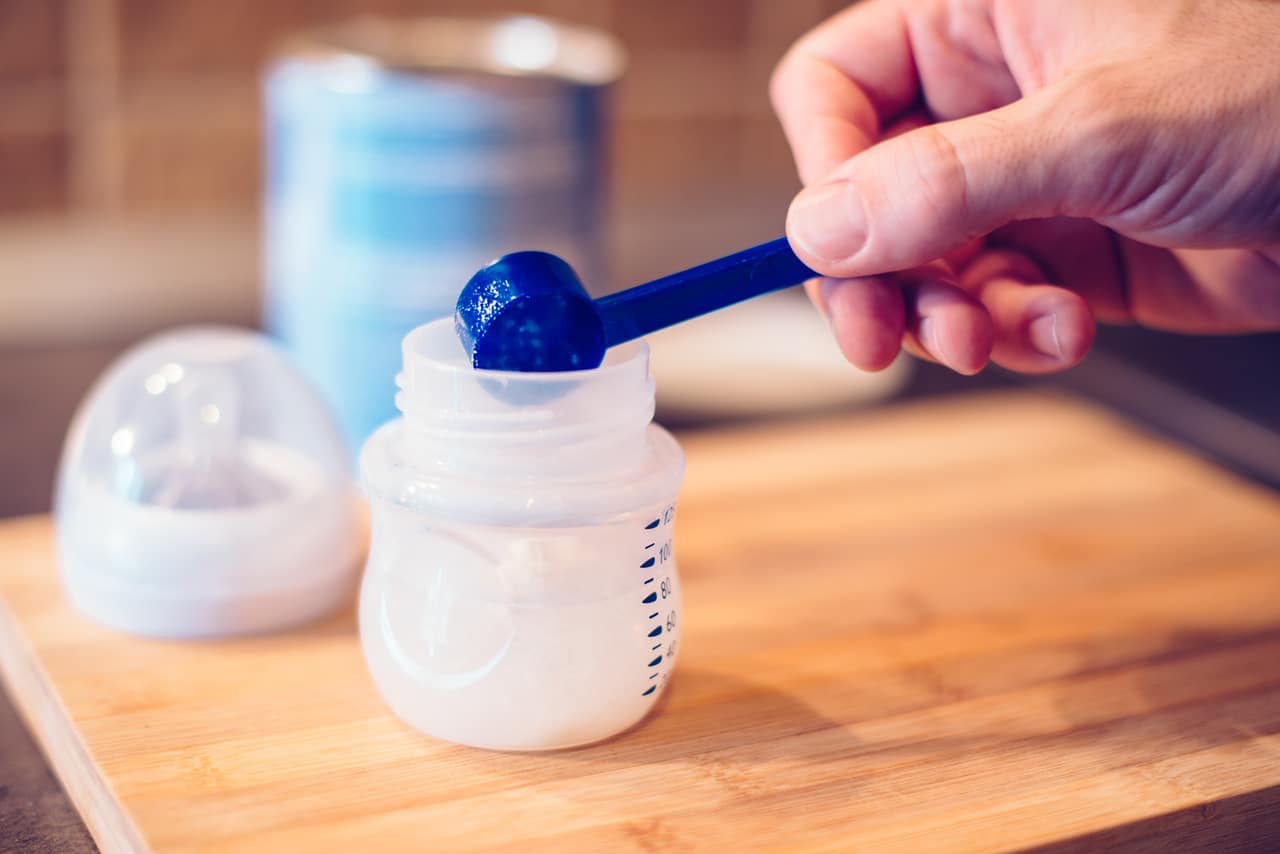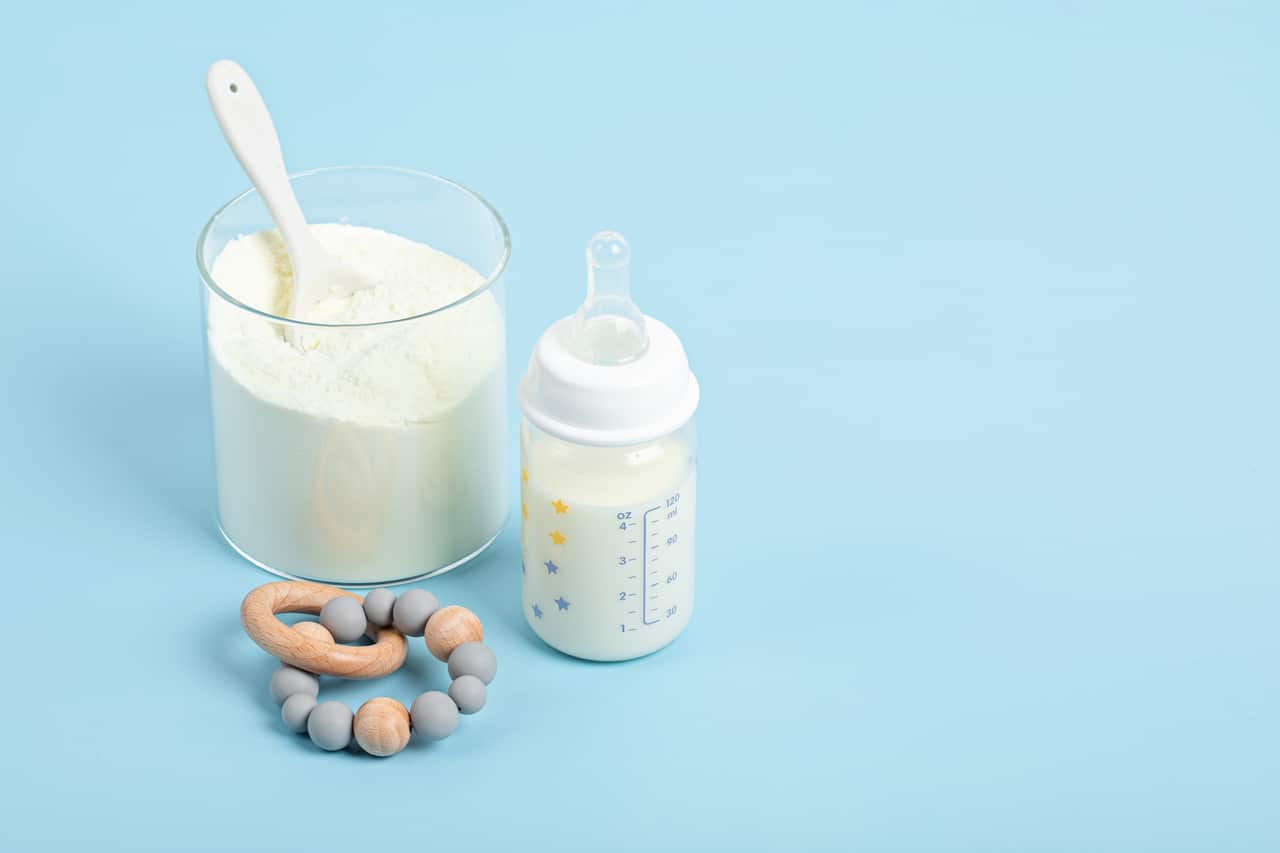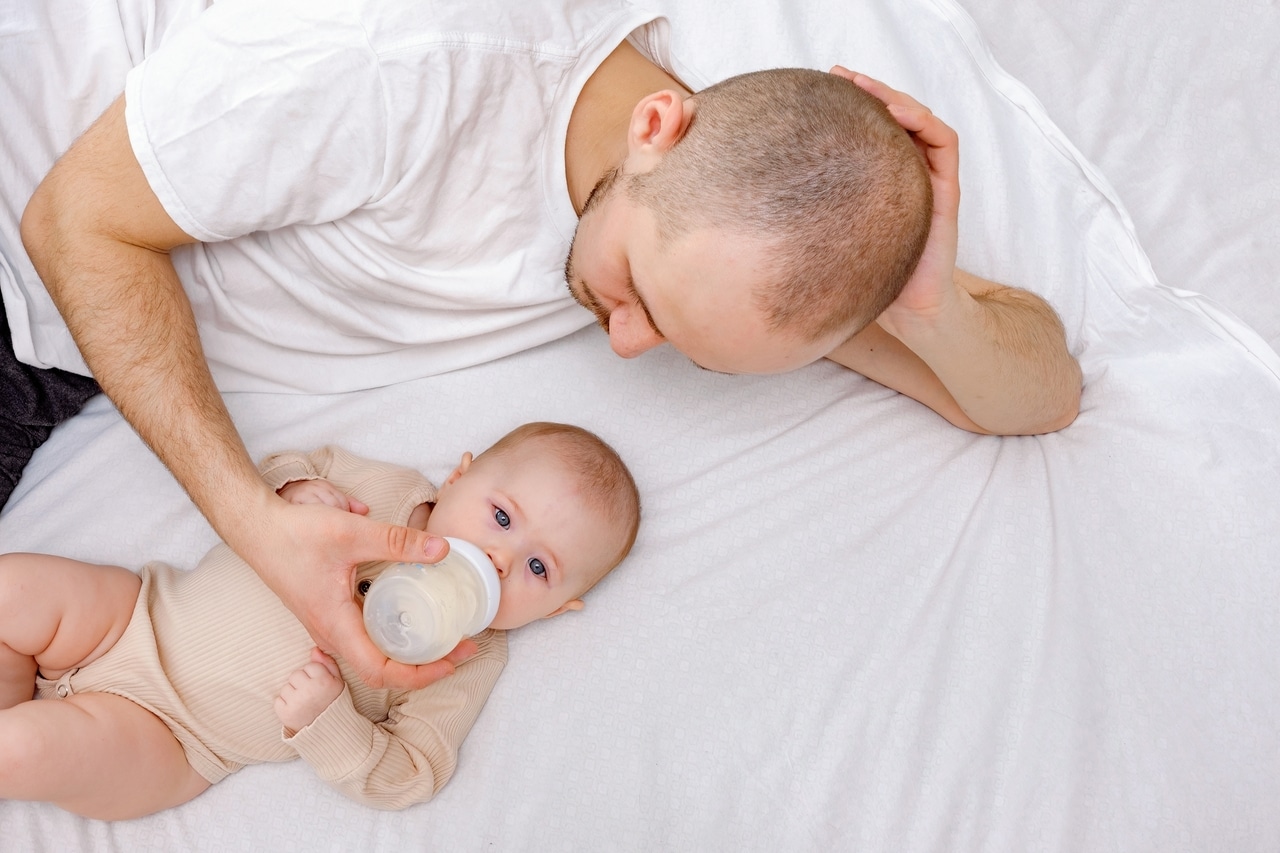Are you considering formula-feeding your baby? With so many different formula feeding guidelines surrounding the amount of formula to give, how to prepare it, and how long it can stay in storage, it’s easy to get overwhelmed. If you’re unsure of where to start or which advice is accurate, don’t worry – we’ve got you covered with our simple and informative guide on formula feeding! In this article, we will provide a comprehensive overview of all things related to How much formula should a baby eat, how to prepare baby formula, and how to store baby formula.
In This Article
What is Baby Formula?
Baby formula is a manufactured food that is designed to provide the necessary nutrients for an infant’s growth and development. It is typically made from cow’s milk or soybeans and is fortified with vitamins, minerals, and other nutrients to ensure that it meets the nutritional needs of infants. Baby formula is often used as a substitute for breast milk when breastfeeding is not possible or desired. It is available in a variety of forms, including powder, concentrated liquid, and ready-to-feed liquid.
The formula is formulated to mimic the nutritional content of breast milk as closely as possible, but it is not a perfect substitute. Breast milk contains antibodies and other immune-boosting substances that are not found in formula, and it is also easier for infants to digest than formula. However, for infants who are unable to breastfeed or whose mothers choose not to breastfeed, the formula can provide a safe and effective alternative for meeting their nutritional needs.

How Much Formula Milk Does a Baby Need?
The amount of formula milk that a baby needs will vary depending on their age, size, and individual needs. As a general guideline, infants should be fed every 2-3 hours or on demand if they seem hungry. The amount of formula per feeding will also increase as the baby grows.
| Age of Baby | Number of Feedings per Day | Amount of Formula per Feeding (ounces) |
|---|---|---|
| 0-4 weeks | 6-8 | 2-3 |
| 1-3 months | 6-7 | 4-5 |
| 4-6 months | 5-6 | 6-8 |
| 7-9 months | 3-5 | 6-8 |
| 10-12 months | 3-4 | 6-8 |
Note: These are general guidelines and may vary based on the individual needs of your infant. Consult with your healthcare provider for specific recommendations.
It is important to consult with your healthcare provider for specific recommendations based on your infant’s needs. They can help you determine the right amount of formula to feed your baby and make adjustments as necessary. It is also important to monitor your baby’s weight and growth to ensure that they are getting the proper nutrition and hydration.
How to Prepare Baby Formula?

Preparing baby formula is relatively straightforward. You must follow the infant formula preparation instructions on the container. Some general steps for preparing baby formulas include the following:
- Wash your hands thoroughly with soap and water before preparing the formula.
- Sterilize all feeding equipment (bottles, nipples, etc.) by boiling them for 5 minutes or using a dishwasher.
- Follow the instructions on the formula package carefully. Different brands and types of formulas may have different preparation instructions.
- Measure out the correct amount of water needed for the formula according to the package instructions. Use clean, cold water. Do not use hot water, as it can cause the formula to lose some of its nutrients.
- If using a powder formula, add the measured amount of water to the bottle. Then add the appropriate amount of powder, as directed by the package instructions. Shake the bottle well to mix the formula until it is smooth and free of clumps.
- If using a ready-to-feed or concentrated liquid formula, shake the bottle well before pouring it into the bottle.
- Test the temperature of the formula by shaking a few drops onto the inside of your wrist. It should feel warm, not hot. If it is too hot, let it cool down before feeding it to the baby.
- Give the bottle to the baby and hold it at a slight angle to avoid air bubbles.
- Discard any leftover formula in the bottle after the feeding. Do not save it for later use.
Note: It is important to follow the instructions on the formula package carefully and to use the correct amount of water and formula. Over- or under-diluting the formula can be harmful to the baby. Always consult with your healthcare provider for specific recommendations based on your infant’s needs.
How to Store Baby Formula?

Here are some steps on how to store baby formula properly:
- Keep the formula in a dry, cool place. The ideal storage temperature is between 50 and 70 degrees Fahrenheit. Avoid storing formula in damp or humid areas, such as the bathroom or kitchen.
- Keep the formula in a sealed container. If you are using the pre-made formula, store it in the original container and make sure the lid is tightened securely. If you are using powdered formula, store it in an airtight container to keep it fresh.
- Avoid exposing the formula to light. Store the formula in a dark place, such as a pantry or cabinet. Exposure to light can cause the formula to break down and lose its effectiveness.
- Once you have opened a container of formula, store it in the refrigerator. Use liquid formula within 48 hours and powdered formula within a month.
- Use a measuring cup to scoop out the correct amount of formula. Do not use a spoon or scoop from the container directly, as this can lead to contamination.
- Use the formula within the expiration date. Check the expiration date on the formula container before using it. The expired formula may not provide the proper nutrition for your baby and could cause harm.
By following these steps, you can ensure that your baby’s formula is stored properly and remains fresh and effective.
How to Choose Right Baby Formula?

By considering these factors and consulting with your healthcare provider, you can choose the right baby formula for your infant.
- Consider your baby’s age and stage of development. Different formulas are designed for infants of different ages, with different levels of nutrients and calories to support their growth and development.
- Consult with a healthcare professional. Your baby’s healthcare provider can help you choose a formula that is appropriate for your baby’s needs and can guide how to properly mix and store the formula.
- Read the ingredients list. A good quality formula will contain essential nutrients, such as protein, vitamins, minerals, and fatty acids. Read the label carefully to make sure it does not contain any artificial colors, flavors, or preservatives.
- Check for any allergies or sensitivities. Some babies may be sensitive to certain ingredients in formulas. If your baby has a food allergy, make sure to select a formula that does not contain the allergen.
- Look for organic formulas. Many parents choose organic formulas, which are free from pesticides and other chemicals. Make sure to look for labels that say “USDA Certified Organic” or “Organic” on the package.
- Consider your dietary preferences. If you are breastfeeding, you may need to choose a formula that is compatible with your diet. Some formulas are made with organic ingredients or are free from certain additives or preservatives.
- Try different formulas if needed. If you are unsure which formula is best for your baby, you may want to try a few different options to see which one works best.
By following these steps, you can make an informed decision about which baby formula is the best choice for your little one.
If you have any concerns or questions about choosing or preparing formula, consult with your baby’s healthcare provider. They will be able to provide more detailed advice and help ensure your baby is receiving the nutrition they need.
How can I determine when my baby’s feeling hungry?
There are several signs that your baby may be hungry, including:
- Crying: This is often the most obvious sign that a baby is hungry.
- Putting their hands to their mouth: Babies may put their hands to their mouth or suck on their fingers as a way to signal that they are hungry.
- Making sucking noises: Babies may make sucking noises or try to latch onto anything nearby as a way to express their hunger.
- Moving their head towards the bottle or breast: If your baby is being fed with a bottle, they may turn their head towards the bottle or try to latch onto it when they are hungry. If you are breastfeeding, they may try to latch onto your breast.
- Fussing or restlessness: Babies may become fussy or restless when they are hungry, especially if they have been awake for a while and have not been fed.
It is generally recommended that infants be fed every 2-3 hours or on demand if they seem hungry. However, every baby is different, and it is important to pay attention to your baby’s cues and needs. If you are unsure whether your baby is hungry, it is always safe to offer them a feeding. If they are not interested in eating, they will likely let you know by turning their head away or refusing to latch onto the bottle or breast.










![Home Renovation Guide [2025]](/app/uploads/2021/04/design-hacks-1-378x300.jpg)
